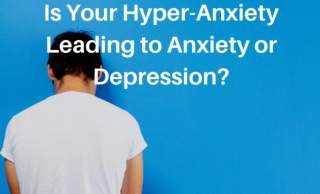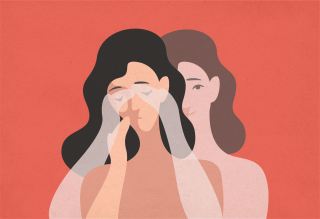Can Your Hyper-Anxiety Lead to Depression?
In his Mental Toughness series, Dr Steve Harris, motivational speaker in South Africa, recently discussed that the drivers for hyper-anxiety are usually the negative legacy emotions of shame and guilt. These self-defeating emotions are triggered opportunistically after you experience the consequences of trauma.
Tragically, hyper-anxiety is also associated with constant rumination about negative events in your past or about events that could happen in the future. This causes you to perpetuate depressive behaviours because you find new, imagined problems to be anxious about.
In this state your reasoning capacity is impeded, and you become governed by a melodramatic, as opposed to a fact-based world view. Thus, instead of rationally recognising and logically analysing your feelings of regret or remorse caused by the trauma that could catalyse a change in your behaviour, you end up searching for reasons to justify your feelings of guilt and shame. The result is blaming others or being angry with them as you try to navigate a constant sense of crisis.
People suffering from hyper anxiety tend to mix up what is a frightening or perceived threats, with a dangerous and real threat. This results in a conflict between the life they expected and the one they have and is mostly accompanied by a notion that they have less, if not – no choices. They often see bad over good and become prone to conspiracies while blaming others. They then struggle to accept responsibility. Their flight or fight response is on high alert which causes exhaustion and burn-out.
Substance Dependence Behaviour
In such circumstances, your brain depends on a pain managing or recreational substance that you see as a medicating, soothing or a stimulating solution – without considering that the substance may be problematic. The misuse of cell phones and social media dependency are also included in dependency behaviour.
The overuse of substances is particularly hazardous when combined with a predilection for addiction. You often become righteous, polarized, irrational, have mood swings, renewed anxiety, fear, distrust, and extreme bouts of anger. When challenged about irrationality, you revert to denial and counter accusations. Anti-social behaviours like lying and stealing manifest and personal hygiene deteriorates.
Extreme Grief can Contribute Towards Depressive Behaviour
During a state of severe sadness, you may experience anhedonia – a lack motivation, a feeling of being left behind, experience chronic remorse, loneliness, irrational hopelessness, and despair. You become a ‘baby doomer’ dominated by the belief that you have lost touch with happiness.
In my opinion, the concept of chasing happiness opens a can of worms. Firstly, we often confuse excitement and goal achievement with happiness. Secondly, the suffering and sacrifice endured in the quest for this goal achievement highlights the opposite, i.e., it magnifies what you are not achieving.
You need to allow room for reflecting on the role of lofty goals and consider cutting back on your expectations if they are at the root of your suffering. Ralph Waldo Emerson wrote, “the purpose of life is not chasing happiness. It is to be useful, honourable and compassionate”.
Should Happiness be our Default Position?
Please follow this link to continue reading this article.
TherapyRoute.com, a proudly South African online mental health resource, improves access to mental health services.
TherapyRoute.com, a proudly South African online platform, empowers visitors to find psychologists and other mental health service professionals and providers like social workers, family therapists, counselling services, and community clinics quickly.
This innovative clinician run directory and mental health resource offers free listings to all qualified mental health professionals, organisations, and service providers.
Today, an increasing number of people turn to the internet to find psychologists and other mental health services. Apart from convenience, this frequently helps people overcome any embarrassment they feel by allowing them to learn more about a professional, or service, before making the call.
South Africa continues to struggle with the legacy of apartheid, and mental health services are no exception. It can be challenging to locate a professional who shares your cultural background or language. Similarly, fears of being misunderstood and unfairly discriminated against often act as barriers to entry.
TherapyRoute.com includes features that help address such challenges.
Some Examples:
Easy to use search. Nearby providers appear automatically
Filter results by identity (Black, LGBT+, Nonbinary, Female...), language (isiZulu, Afrikaans...), issue (depressions, anxiety, relationships...), and more
Find online clinicians when no nearby results are found
Thousands of qualified clinicians and providers to choose from
The following core values guide the direction of the platform.
1. Improve access to mental services
TherapyRoute.com improves access to services by innovating tools to empower visitors to find the help they need.
Thanks to a team of volunteers, the database includes many verified community clinics and hospitals. The intention is to link anyone in search of therapy or help, be they rich or poor, with a service that meets their need and means.
Many of the low/no fee listings are included in the following city-specific 'How to find a therapist' guides.
How to find a therapist in Cape Town
How to find a therapist in Durban
How to find a therapist in Johannesburg
How to find a therapist in Pretoria
2. Promote awareness of mental health and talk therapy
TherapyRoute.com equips professionals to publish mental health and therapy-related writing online. The sites growing library of excellent articles promotes awareness of the value of talk therapies that are proven to be effective, relational, and which respect human complexity.
3. Facilitate professional and service visibility
TherapyRoute.com enables qualified mental-health professionals to create a website and represent the services they provide.
The platform is open to all qualified mental health professionals, clinics, counselling centres, rehabilitation programs, and group practices. Private practice and community services are welcome.
Are you looking for a therapist or a mental health service?
Visit TherapyRoute.com to find your best fit therapist now.
Are you a qualified mental health service provider?
Visit TherapyRoute.com and list your service for free.
Do you run a resource page?
Add TherapyRoute.com and help people find the mental health services they need.



